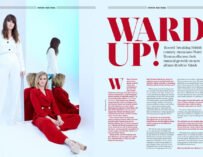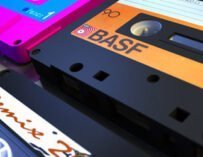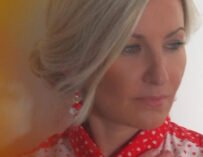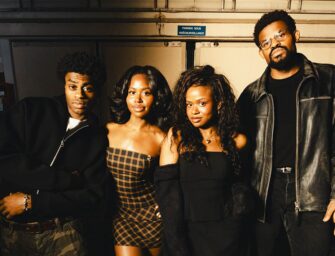
Ward Thomas. Lizzy on going to Nashville: “We’ve found a lot of people that we love to work with and we get a lot of our favourite songs out of them.”
Twin sisters and bandmates Catherine and Lizzy reveal all about their hopeful and uplifting new album ‘Music In The Madness’
It’s almost a decade since Ward Thomas released their debut album, From Where We Stand, back in 2014. Heralding the arrival of a burgeoning new UK country scene, sisters Catherine and Lizzy haven’t looked back. 2016’s Cartwheels topped the UK album chart and their continued success with Restless Minds and Invitation is a testament to the duo’s enduring songcraft – always underpinned by a knack for coming up with memorable melodies and gorgeous harmonies.
Now returning with Music In The Madness, the duo are using their musical prowess to raise our collective spirits during these increasingly difficult times. Opening with the title track, there’s an immediate injection of hopefulness when those twin voices let out their first cry. Written on writing trips in Nashville, before being completed with producer Ed Harcourt back in the UK, a similar sense of sunlight bursting through the curtains illuminates the rest of the album. No doubt Catherine and Lizzy will shine that same glow on audiences when they head out on tour later this month.
Shortly before the album’s release, we were lucky enough to learn all about the making of Music In The Madness…
Read our 2018 interview with Ward Thomas
Do you specifically block out time to write new material or are you always writing?
Lizzy Ward-Thomas: “It’s a bit of both. I think we’re always writing, because we’re always wanting to keep momentum, but I think there’s quite a big gap between Invitation and Music In The Madness. We just got back from Nashville, from a writing trip. We always go there and write, because we have so many people there that we love to write with and we’ve formed some great relationships with. So we just want to keep writing and putting songs out and keep people happy.”
And will you go to Nashville with a clean slate or do you have ideas in your phones/notepads as a starting point?
Catherine Ward-Thomas: “We’ve always got a few ideas on our phones and in our notepads that you think of randomly as you live life. And then sometimes we’re like, ‘Oh, I’m going to save that because we’ve got a co-write in Nashville that we’re specifically excited about, and I don’t want to waste that idea on anyone else.’ So we’ll save that because it could be a really special song with that specific co-writer.”
LW: “And sometimes we might have an idea that we came up with years ago, like a melodic idea, that naturally comes in to the session. It will be sitting around and we keep revisiting it and remembering it, so it’s got to be a memorable melody. So that comes out and it becomes a song. We’ve got this one melody that’s been sitting around for ages that we need to write.”
Are there any examples from Music In The Madness?
LW: “Loved By You…”
CW: “…You’d played that for ages on the piano.”
LW: “That was a melody that I’d made up on the piano and then we wrote it with a guitar with Rebekah Powell in Nashville. So that’s a good example.”
And is it a case of holding your nerve until the right song comes along for that melody?
LW: “When you’re sitting in the room, and depending on the topic or concept that you’re talking about, that melody might fit really nicely to the mood of the concept. So for example, we went into the room with just the three of us: Rebekah, Catherine and I, and we were talking about the concept of being brave enough to be loved or love someone else. And I was like, ‘Oh, I came up with this melody at home a couple of months ago. It’s quite an emotional melody and it might work well with this idea.’ I played it and sang it and then it grew from there.”

Ward Thomas. Catherine: “The discipline is a good thing. It really forces good things out of you.” Photo: Marek Puc
Have you always found it easy to discuss those deep themes and personal feelings with other songwriters or is it something you’ve grown into?
CW: “I think we individually found it very different and it depends on the kind of people you write with. Sometimes you walk into a room and it gives you this immediate feeling of, ‘I can share every single detail about my life with you and we’ll get a great song out of it.’ Other times, you’re like, ‘This is the kind of writing session that I just want to write a light-hearted fun song in. We’re not really in that place where I want to spill my guts out to you.’ But we’ve had sessions with people that, within the first 10 minutes, you immediately leave your ego at the door and you’re all best friends two hours later.”
LW: “But also, we’ve had sessions where it just hasn’t worked. And that’s important to mention because it can’t work with everyone. It could be the nicest people, we could all get on really well, but creatively it might not fit.”
Is that a personality thing?
CW: “Sometimes personality, sometimes creative vision, sometimes neither of you are in the right headspace. We’ve had sessions that didn’t work first time around and then did work the second time. We’ve had sessions that worked really well the first time around and then the second time around it didn’t, and we’ve had sessions that didn’t work and we don’t want to go back to because it didn’t click.
“I remember there’s this very amazing songwriter in Nashville called Ralph Murphy and he said of the 1,000, people he might have written with, 30 are people that he’d want to write with again. It’s a very rare case to get these amazing sessions, and then you just want to keep writing with them.”
LW: “That’s why we go to Nashville, because we’ve found a lot of people that we love to work with and we get a lot of our favourite songs out of them.”
Are there any new collaborators on this album?
LW: “We’ve got Joan Of Arc, a song that we wrote with Ed Harcourt. He produced the album and we’d never written with him before, just the three of us.”
CW: “And hopefully there’ll be some collaborations on the future record as well. We’ve got some plans to collaborate on some of the songs that will already be out, new versions, and there’ll be brand new songs.”
LW: “And Love Does was a new collaboration. Not with Rebekah, but with Aaron [Eshuis].”
How do you get yourselves into a place where you can walk into a session and make creativity happen at a specific moment?
CW: “It’s quite scary. And I still have that thing, ‘Oh my God, what if today’s really hard?’ A lot of the time when we’re in Nashville, we’re there to be so disciplined, we’re there to write and come home with a certain amount of songs. And hopefully they’re good. The discipline is a good thing. It really forces good things out of you. And you’re writing with people that do this every day; they go into a session and it feels like a job. They’re so fit, mentally, in their songwriting brain, that it will work – even if it’s something you don’t feel that drawn to at the end. The discipline is a good thing for creativity.”

Ward Thomas. Catherine: “The more albums we make, the more we realise that that freedom of not quite sitting perfectly in a genre has actually presented an opportunity for us in our writing.”
Can you get yourselves prepared for that discipline?
LW: “Well, it’s a different thing every time. Sometimes we’ll have a coffee at our favourite place, Fido. This time we had a specific reference… if you’re writing with a producer, you can go in with a reference of some of the music that you love, or a song you want to write a similar vibe to. So on the first session of this recent trip to Nashville, we had an upbeat reference song that we wanted to write a similar kind of mood as. We went into the room and the producer came up with a great track, and we made up a melody. It’s quite nice to do that because it’s like we’ve prepared and it makes the beginning part of the song quicker.”
And are you there armed with instruments yourselves?
CW: “Sometimes, it depends. Most of the time the producer is way more of a superior player than both of us, so we’d rather they take the lead. Then we can focus on the top line and the melody. Other times, you’ve come up with a melody that has the guitar part with it, and then you end up losing the guitar because they’ve come and taken over and done a much better job. So it totally depends on who the session is with.”
At what point do you see the songs as being part of an album rather than individual songs?
CW: “On this record, specifically, when we wrote Music In The Madness, it very much felt like finding the light in the dark, finding that moment of joy when there’s a lot of despair, because it really reminds you of how humanity can pull through and you can see the best in people. That theme was a conversation we talked about a lot when we were writing the songs for the record. It doesn’t all follow that theme and it wasn’t like, ‘Right, we have to write an album that’s all about this now.’ It was just a subconscious theme that we were very drawn to. It feels very relevant to have a record that reflects that whole thing.”
LW: “The two words that come to mind for this whole album are “love” and “hope”. I think our heads were just naturally there. In the new music industry with streaming and Spotify… we love writing projects because your head is in a certain place when you’re putting an album together… but nowadays you can write the song and release it straight away. So we’re getting our heads around that as well. Trying to get our head out of having to write a project.”
Are you always both on the same page with those overarching themes?
CW: “Sometimes, in the session, we’ll have a different point of view on a topic or not be on the same page in terms of how we see something sounding. But as an album, and as the body of work, we very much feel like it happens so naturally. It’s not even really a conversation it’s just, ‘Oh, yeah, that makes so much sense, let’s go down that avenue.’”
As well as the album itself, are you also thinking about your body of work and how Music In The Madness fits in with Invitation and all the way back to Cartwheels and the debut album or does that not really come into it?
LW: “I think it comes into it from what we’ve learned musically, and life-wise from making those albums. From album number one, it’s fun to listen right back, because we made that when we were 17/18. We were so young. And the topics, the sound, the harmonies…We’ve learned a lot and we look back at our backup catalogue and we feel lucky and privileged for the people we’ve worked with and learned from.”
CW: “And for us as well, we’ve never really known where we fit in with a genre. We very much think of ourselves as a country act. But you talk to some people and they go, ‘I don’t really listen to country, I feel like you guys are more Americana.’ So when it came to where we fit, it was always very difficult to place. Sometimes that was a huge opportunity, because it meant that we were less restricted with what we wanted to do. But other times it felt really difficult because it’s like, ‘But where do we fit?’ The more albums we make, the more we realise that that freedom of not quite sitting perfectly in a genre has actually presented an opportunity for us in our writing.”
There’s a confidence and naivety of youth that perhaps lends itself to music because you’re fresh, you don’t know what to expect, and you can just throw yourself into it. Is that a fair reflection and, if so, is that something you miss?
CW: “Very much so. I don’t know if Lizzy did this too, but from about three or four years in, you aren’t just writing a song and going, ‘That sounds good.’ You’re also thinking, ‘I wonder if management will think that this could be one that we take to radio? I wonder if this song could be something that we take to sync?”
LW: “Even more now with so many platforms it’s, ‘Will this stream well, will this get on that playlist, will this work on TikTok?’”
CW: “And you get completely corrupted by it. But I think we’ve gone full circle now because we started by thinking that and going, ‘Oh, my goodness, we’ve been so corrupted. I’ve got this bloody annoying voice in my mind that’s taken away the joy of writing.’ And then we concluded that you can’t guarantee that any of this is going to work, so you might as well just do the best you can. So we try and write the best music we can, and we always keep that philosophy. That’s the philosophy that we’ve gone on with for this album. We’re throwing away all of that, ‘Oh, I wonder if this will work for this?’ We just go, ‘Let’s just write some good songs and hope that people like them.’”
So what happened after you’d written the songs in Nashville and then brought them back to England to work on them with Ed?
LW: “Well, sometimes we created a whole load of demos with a guy called Ian Barter. He made them sound really nice. Some were just voice memos, literally our voices with a guitar or a piano. So we’re working from a blank canvas. But we both made a Spotify playlist of some reference ideas for the producer of songs that like… ‘I can hear this song sounding along the lines of this kind of vibe.’ And that really helps producers. They love a reference. If they’re working from a voice memo, it’s quite hard for them to understand your vision. That’s how we did it with it Ed.
“With Ed it was really fun, because we got to work with all our band as well. They came into the studio. He’s a real character. So we thought he would do such a good with our song Justice And Mercy. He likes to play around and put quirky things on to record to make it sound interesting and different, which worked really well. Billy Adamson our guitar player put a really cool, dark guitar solo on Justice And Mercy.
“What was great about Ed was he was really collaborative with our musicians. He was really interested to hear what they thought about different parts within the bass arrangements, just the kind of basics at the beginning when we all did it in one room. We then did vocals with Rachel Furner who vocally produced our stuff later on.”
CW: “It was nice because it felt like we were all in the room together working on it. And that’s unique for us.”

Ward Thomas. Catherine: “You can’t actually guarantee that any of this is going to work, so you might as well just do the best you can.”
Did any of the songs end up sounding completely different to how you envisaged them when you were writing them?
CW: “If It All Ends Today came out completely different. We change the vibe completely. Yeah. And there’s something quite exciting about being like, ‘Should we just workshop this for a bit?’ And then you’re like, ‘Wow, this sounds completely different to how we were imagining it.’ And it sounded so much better.”
LW: “Another good example is Justice And Mercy. For three weeks there was something missing, the energy was not there. Then we called up Cheyenne Medders, who we wrote that song with. He’s an incredible guitar player in Nashville, and it was missing the original guitar part that he wrote for it, we didn’t have it the way he played it. And he put all of it down, and it went straight into mix, and I was like, ‘It’s fixed.’ It was a quick fix, we just needed the original guitar part. We were trying to be too dark and clever and it lacked the basic acoustic guitar. That one element brought all the energy back.”
Do you do you write lyrics together or does one of you take the lead?
CW: “It depends, sometimes Lizzy will take the lead, sometimes I will.”
LW: “Sometimes if I write a melody Catherine will come up with the lyric on top of that melody.”
CW: “Lizzy tends to take the lead on most melodies to be fair. There might be the odd time where I go, ‘How about this?’ But most of the time Lizzy drives the melody. She can hear the melody quicker than me. And that’s helpful because you can have the driver and then the passenger that helps direct.”
When it comes to harmonies, are you so entwined with each other’s voices that you naturally know what to do?
LW: “Because we’ve been singing together as twins for a really long time, we’re very entwined, but we also still like pushing ourselves to come up with interesting things, like fifths.”
CW: “The harmonies are normally where the twin thing comes in, because we’re so used to being around each other that we do a lot of those together.”
LW: “It’s fun when we work with certain producers that push us to come up with harmonies that we would never have come up with ourselves.”
We’re talking a couple of weeks before the album’s out, is this a fun point or a terrifying one?
CW: “It’s a very terrifying point in some ways, because the work is done on the music but we now need to get people to hear it and hope that they like it. And there’s an element of there’s much less control in this phase, you have to just hope for the best”
LW: “We have to get people to buy the album and buy tickets for the tour. That’s the scary part.”
What gives you the most pride in terms of songwriting?
CW: “I think every single song that makes it onto an album has to be a song that we listen to and love, because otherwise it doesn’t deserve to be there. We’re proud of the album, we’re feeling very excited for people to hear it, and we just hope people like it.”
LW: “The ultimate reward is when we go on tour and see people singing and liking our songs, and relating to them in some way. It’s just like, ‘Oh, wow, they actually liked the song.’”
Music In The Madness is out now via WTW Music and Ward Thomas are heading out on tour later this month. All the dates, music and more can be found at wardthomasmusic.co.uk
Click here for more interviews


































Related Articles